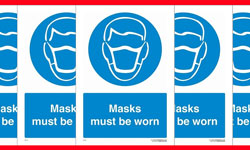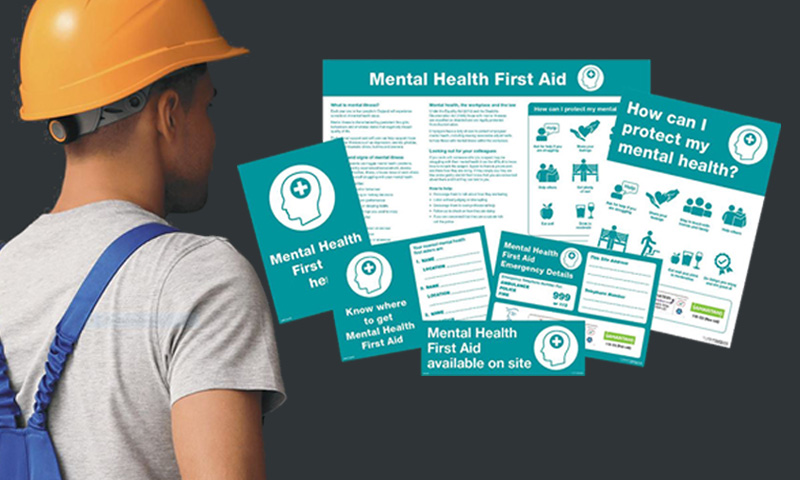Blog
Team Welfare
A happy and healthy workforce is the bedrock of any business. Let's make sure your team welfare is the best in your industry.

Stress Awareness Month is a worldwide campaign introduced to increase public awareness on the negative impact stress can have on our body and mind. Read More

The Health and Safety Executive (HSE) have been highlighting the dangers of not having access to the correct respiratory protection equipment throughout the summer. Regularly breathing construction dust can cause diseases like lung cancer, asthma, Chronic Obstructive Pulmonary Disease (COPD) and silicosis. Construction workers have a high risk of developing these diseases because many common construction tasks can create high dust levels.
Read More
This month is ‘Talk to Us’ month and the Lighthouse Construction Industry Charity is shining the spotlight on the importance of talking about wellbeing with friends, loved ones, colleagues and professionals to prevent mental health issues reaching crisis point.
Read More
Government data show that an estimated 2.6 million working days were lost in the Construction sector due to workplace injury and work-related illness in 2022/23. Improving communication is a key factor in accident and illness prevention. Read More

Winter months can create difficult working conditions for construction teams. Slips, trips and falls are always a concern in construction, but frosty mornings, ice and snowfall mean there is an increased risk to contend with. Read More

Skin care is an ongoing challenge for construction teams. As cold, wet and icy conditions become more frequent in winter months, workers face increased risk of occupational skin disorders. Read More

How many of your team have an ongoing medical condition? Do you know who is taking prescription medication? How many of your team have an allergy? Read More

Many of us look forward to summer weather, but for businesses with outdoor teams it also brings extra challenges concerning sun safety. In this week’s blog, we take a look at what you can do to keep your outdoor teams safe in the sun. Read More

Emergency ID tags have become commonplace at high risk sites such as those found in the construction, oil and gas industries. Recently, a customer got in touch to ask if the adhesive used in the tag might affect the integrity of a hard hat and compromise safety. Read More

Someone suffers a sudden cardiac arrest (SCA) every six minutes in the UK. When SCAs occur out of hospital, the use of an automated external defibrillator (AED) significantly improves survival rate. Investing in a workplace defibrillator is a smart move to safeguard your team. Read More

High visibility workwear, also known as Hi Vis or Hi Viz clothing, improves a worker’s visibility using a mix of fluorescent material and reflective strips. As the days get shorter and daylight working hours decrease, it’s more important than ever to ensure workers can be clearly seen. Read More

As winter approaches, organising cold weather workwear and personal protective equipment (PPE) should be a priority. What’s more, with the rise of more extreme weather patterns in the UK, we must be more vigilant than ever and plan ahead to keep teams safe. Read More

Emergency medical ID tags, also known as ICE tags or EMITAGS (Emergency Medical Information Tags), provide a casualty’s medical details when they are unable to speak for themselves. They give paramedics, first responders and first aiders immediate access to critical medical information and emergency contacts without having to raid HR files. Read More

Designed with optimal safety and ease of use in mind, the PowerCap® Infinity® respirator delivers exceptional performance for team members requiring air purification. Read More

Up to 60,000 people die each year in the UK from sudden cardiac arrest (SCA). Worryingly, fewer than 1 in 10 will survive an SCA which occurs out of hospital. The use of an automated external defibrillator (AED) significantly improves survival rate. Read More

Hosted by the Mental Health Foundation (MHF), this year’s Mental Health Awareness Week (14th -20th May) is focusing on stress. Research shows that two thirds of us experience a mental health problem in our lifetimes, and stress can be a key factor. Read More

Melanoma skin cancer is the fifth most common form of cancer in the UK. The disease kills over 2,500 people each year in the UK alone and, worryingly, its incidents rates continue to rise. With Cancer Research UK reporting that an enormous 86% of cases are preventable, it’s vital employers are doing their bit to keep high risk workers safe. Read More

A canteen facility is an essential component for the majority of construction sites, especially larger ones. Not only is a canteen a requirement of health and safety law in most circumstances, a well-stocked site canteen can also significantly improve staff wellbeing and productivity. Read More

Slips and trips are the biggest cause of non-fatal injuries at work, accounting for 29% of all non-fatal accidents in 2017. That equates to an estimated 1.6 million lost working days. Read More

How to assess your workplace size, layout and risk level to determine first aid kit numbers and requirements. Read More

The winter months can create treacherous conditions and increase the chance of accidents occurring on-site. Low temperatures, frosty mornings, ice and possible snowfall mean that slips, trips and falls are a risk. Read More

No more hoodies under hard hats! We're excited to launch a brilliant innovation for the winter season: The SureFit™Beanie from JSP. Read More

70 million working days are lost to due to mental ill health every year, costing the UK economy somewhere in the region of £70-100 billion. This includes the most commonly experienced symptoms of stress and anxiety, through to more complex conditions, such as depression, bipolar disorder and OCD. Read More

Getting employees on board with health and safety can be a challenge for health and safety professionals. The best plans, policies and procedures count for little if team members don’t incorporate them into their daily tasks. Read More

The days are getting shorter and the temperature's slowly dropping. Seasonal changes provide a good opportunity to conduct a safety audit on-site and prepare your team for the months ahead. Read More

KEY TAKEAWAYS: Keep workers cool and hydrated by providing plenty of accessible water and clear advice on avoiding heat stress. Read More

Sudden Cardiac Arrest (SCA) is a leading cause of death globally. In the UK alone, it kills more people than breast cancer or lung cancer, claiming the lives of 250 people every day. Read More

Branded workwear and safety gear can offer substantial business benefits. From boosting brand image, to improving safety and productivity: branded workwear is well worth the investment. Here are our top 5 top reasons for including kit branding in your strategy. Read More

Seasonal Affective Disorder (SAD) is a type of depression that manifests in a seasonal pattern and tends to worsen during the winter months. Sufferers may experience symptoms including low mood, lethargy, lack of motivation and irritability. Read More

It's not always a problem you can see, but workplace dust and other airborne particles can cause serious damage to your workforce Read More

As the coldest winter months approach organising winter personal protective equipment (PPE) should be top of your to-do list. Not taking appropriate measures to protect employees in cold weather could well constitute a breach of your duty of care. Read More

Outdoor working is an inescapable scenario in many industries. Those who spend a lot of time outside have a much higher risk of suffering from skin damage and heat related illnesses. Read More

Industrial zones and construction sites are high risk areas when it comes to sanitation and hygiene. Here are 7 simple ways you can cut sick days and boost staff well-being with good workplace hygiene. Read More

Imagine the scenario: a construction worker is found unconscious at your site. Paramedics arrive at the scene quickly and need to know about the patient - do they have any medical conditions, are they on any medication? Read More

St John Ambulance are providing a course to help take the shock out of using Defibrillators Read More